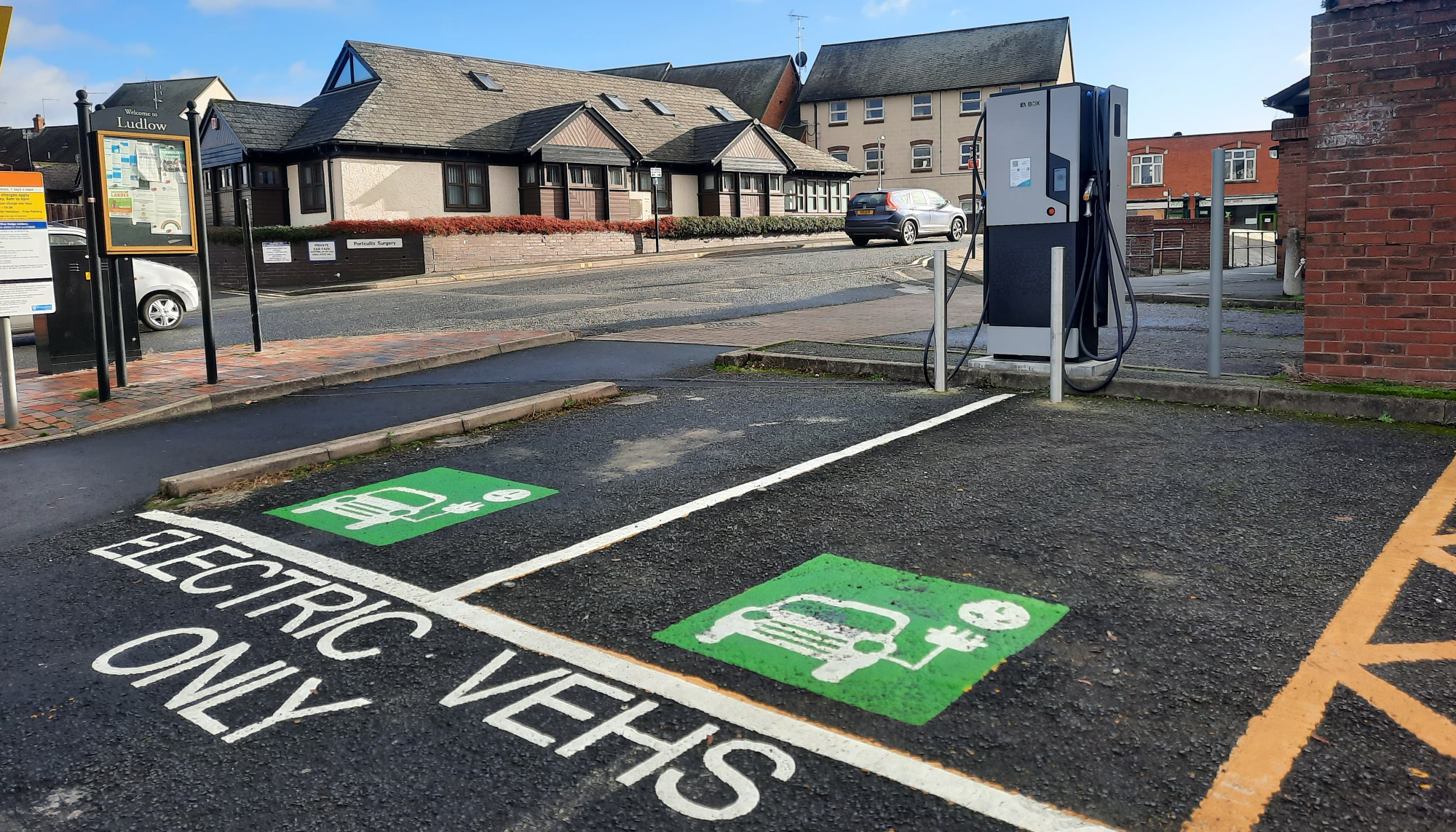On Wednesday, Boris Johnson announced his ten point plan for a green industrial revolution. While not as great as he made it out to be, especially as only £4 billion of the £12 billion pledged is new money, it was nevertheless a welcome move from a government that had pushed roads to the top of its transport agenda.
The prime minister’s ten point plan seeks to increase power from offshore wind; increase low carbon hydrogen power; new nuclear power; green public transport, cycling and walking; zero emission jets (really?) and green ships. The plans also seek to accelerate the shift to zero emission vehicles, including by financing the rollout of on-street charging points.
Shortly before Boris Johnson’s announcement, Ludlow Town Council launched a welcome consultation on installing on-street charging points in Ludlow.
Ludlow Town Council’s consultation is being conducted in partnership with Ludlow 21’s Sustainable Transport Group. The survey asks about the extent of electric car ownership and for views on installing on-street charging points around the town. The consultation is open until 16 December and can be completed via the council’s website.
Boris Johnson’s commitment to ending the sale of petrol and diesel vehicles by 2030 is welcome. It also presents challenges to consumers, manufacturers and councils. However, manufacturers have been gearing up to deliver the all-electric transport age and part of Johnson’s promise is to deliver the gigafactories needed to produce batteries. And most consumers would leave fossils fuels behind if they could get the comfort, driving range and price. That will be the case. The story of modern technology is faster production, reduced use of materials, lower costs and greater attention to consumer needs.
Councils face one of the biggest challenges in providing on-street charging infrastructure. Charging points in car parks are straightforward and we already have two charging bays in the Galdeford car park. But installing enough charging points in neighbourhoods without off street parking will be a challenge, especially in historic towns like Ludlow.
Fortunately, other towns and cities have led the way with installing charging points. Cars can park by a lamppost and top up, as the Go Ultra Low City Scheme in London has shown. New roadside charging points need be no more than a small pillar. There is, therefore, no reason why charging infrastructure need be intrusive or conflict with conservation aims.
Moving to electric vehicles will help the UK meet its ambition to go carbon neutral by 2050. But it doesn’t mean the transition will be without problems.
In recent years, attention has turned to pollution from tyres and brakes. Experts predict non-exhaust emissions will be up from 7.4% today to 10% of all UK PM2.5 emissions by 2030. This could be a major problem in the cities. We don’t know whether it is a problem in Shropshire because there are no monitoring stations, though there is a single station in Telford. I would not expect this to be a significant issue in Ludlow but we should be careful when we describe electric vehicles as pollution free.
Battery technology relies on mined metals and rare earths, including cobalt. Mining is rarely environmentally friendly and can be a health risk. Fortunately, the lithium and cobalt used in electric batteries can be recycled. I am surprised that there is no mention of recycling in Boris Johnson’s announcement. If we are to continue to consume natural materials, we must also conserve them. We can’t just leave recycling to the market, we need legal obligations to recycle batteries under a UK equivalent of the EU Waste Electrical and Electronic Equipment Directive (WEEE). That will push manufacturers towards ensuring that car batteries (mobile phones too) are easier to recycle.
(Household batteries are collected for recycling from your doorstep in Shropshire. Just put them in a clear bag and leave it on top of the recycling box.)
Could almost every vehicle on Britain’s roads be electric before 2050? I hope so and installing EV charging points around Ludlow will be one step towards that ambition.
The prime minister’s commitments
Like all government statements in these eco conscious times, Boris Johnson recycled previous commitments. Philip Dunne, Ludlow MP and chairman of the commons environmental audit committee, got it right when he said: “It is disappointing that of the £12 billion funding in the plan, only £4 billion is new.” It is more than disappointing. £12 billion is only a third of what is being spent on new roads.
Extracts from The ten point plan for a green industrial revolution published 18 November 2020.
“We are taking decisive action to end the sale of new petrol and diesel cars and vans by 2030, with all vehicles being required to have a significant zero emissions capability (e.g. plug-in and full hybrids) from 2030 and be 100% zero emissions from 2035.”
“We will invest £1.3 billion to accelerate the roll out of charging infrastructure, targeting support on rapid charge points on motorways and major roads to dash any anxiety around long journeys, and installing more on-street charge points near homes and workplaces to make charging as easy as refuelling a petrol or diesel car. And whilst the costs of EVs are already falling, we will provide £582 million to extend the Plug-in Car, Van, Taxi and Motorcycle grants to 2022–23 to reduce their sticker price for the consumer.”



